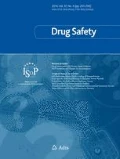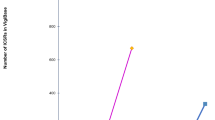Abstract
Background: The WHO Programme for International Drug Monitoring (PIDM) was established in 1968 following the thalidomide disaster. The PIDM has had considerable success in analyzing drug-related adverse event reports, but more limited progress has been made in analyzing vaccine-related reports. In June 2005, the Global Advisory Committee on Vaccine Safety, acknowledging these limitations, called for a global consultation to address the need for improved monitoring and analysis of vaccine-related adverse event reports on an international level.
Objective: In preparation for this consultation and as part of a larger study designed to evaluate the PIDM, a survey of the National Pharmacovigilance Centres of all 76 countries participating in the PIDM at the time the survey was conducted.
Results: Thirty-six countries (47%) responded. Of the 36 responding countries, 16 (44%) reported having a separate surveillance system for adverse events following immunizations (AEFIs) and 30 (83%) reported forwarding AEFI reports to the PIDM. Seven of the 36 countries (19%) indicated that one or more population subgroups are systematically excluded from their country’s AEFI surveillance system. Five of the seven countries exclude reports concerning recipients of travellers’ vaccines; three exclude recipients of vaccines administered by private physicians outside the national immunization programme and supply scheme; and five exclude reports from the military sector. Only half of the respondents knew of the Brighton Collaboration, a major international initiative aimed at the standardization of AEFI definitions.
Conclusion: The survey identified critical elements that should be addressed quickly to improve global vaccine safety monitoring. Communication between national adverse drug reaction and AEFI surveillance authorities, ability to pay for advancing technology in developing countries, and proper use of services and terminologies are issues of concern.



Similar content being viewed by others
References
The Uppsala Monitoring Centre. Viewpoint part 2: watching for safer medicines, the scientific and technical story [online]. Available from URL: http:/www.who-umc.org/graphics/7001.pdf [Accessed 2008 Mar 20]
The Joint Commission. Sentinel event [online]. Available from URL: www.jointcommission.org/SentinelEvents/se_glossary.htm [Accessed 2008 Mar 20]
The Uppsala Monitoring Centre. Joining the WHO Programme for International Drug Monitoring [online]. Available from URL: http://www.who-umc.org/graphics/4805.pdf [Accessed 2006 Jun 7]
Uppsala Monitoring Centre. Uppsala (Sweden): the Uppsala Monitoring Centre [online]. Available from URL: http://www.who-umc.org/DynPage.aspx?.id=13140&mn=1514#6 [Accessed 2008 Mar 20]
WHO Drug Dictionary [online]. Available from URL: www.who-umc.org/DynPage.aspx?id=13120&mn=1510#dd [Accessed 2008 Mar 20]
Uppsala Monitoring Centre. The Anatomical Therapeutic Chemical (ATC) classification system [online]. Available from URL: http://www.who-umc.org/DynPage.aspx?.id=30537 [Accessed 2006 Jul 30]
Brighton Collaboration. The Brighton Collaboration [online]. Available from URL: http://www.brightoncollaboration.org [Accessed 2006 Jun 15]
Council for International Organizations of Medical Sciences (CIOMS). Current programme and planned activities: Joint CIOMS/WHO Working Group on Vaccines [online]. Available from URL: http://www.cioms.ch/frame_current_programme.htm [Accessed 2006Jul 9]
Uppsala Monitoring Centre. Frequently asked questions about Vigimed [online]. Available from URL: http://www.who-umc.org/DynPage.aspx?.id=30535 [Accessed 2006 Jun 10]
Surveillance for Safety Following Immunization: Vaccine Adverse Event Reporting System (VAERS): United States, 1991–2001. MMWR 2003 Jan 24; 52 (SS-1): 1–28
Global Advisory Committee on Vaccine Safety: 9–10 June 2005. Wkly Epidemiol Rec 2005; 80: 242–7
WHO consultation on global monitoring of adverse events following immunization. 9–10 January 2006. Wkly Epidemiol Rec 2006; 81: 261–5
Letourneau M. Improving global monitoring of vaccine safety: an evaluation of the World Health Organization Programme for International Drug Monitoring and Adverse Reactions Database on how they serve the needs of vaccine safety. Thesis submitted to the Faculty of Graduate and Postdoctoral Studies in partial fulfilment of the requirements for the MSc degree in epidemiology, Epidemiology and Community Medicine [dissertation]. Ottawa (ON): University of Ottawa, 2007
Letourneau M, Wells G, Walop W, et al. Improving global monitoring of vaccine safety: a quantitative analysis of adverse event reports in the WHO Adverse Reactions Database. Vaccine 2008; 26: 1185–94
Acknowledgements
The authors would like to acknowledge the contributions of Dr Adwoa Bentsi-Enchill, Dr Mary Couper and Dr Shanti Pal, and thank them for kindly reviewing a draft of the manuscript. We would also like to thank the Canadian Public Health Association, Canadian International Immunization Initiative, for funding travel expenses, and survey respondents for their participation in this study.
The corresponding author is a staff member of the World Health Organization. The authors alone are responsible for the views expressed in this publication and they do not necessarily represent the decisions, policy or views of the World Health Organization.
© World Health Organization [2008]. All rights reserved. The World Health Organization has granted the publisher permission for the reproduction of this article.
Author information
Authors and Affiliations
Corresponding author
Rights and permissions
About this article
Cite this article
Letourneau, M., Wells, G., Walop, W. et al. Improving Global Monitoring of Vaccine Safety. Drug-Safety 31, 389–398 (2008). https://doi.org/10.2165/00002018-200831050-00003
Published:
Issue Date:
DOI: https://doi.org/10.2165/00002018-200831050-00003




